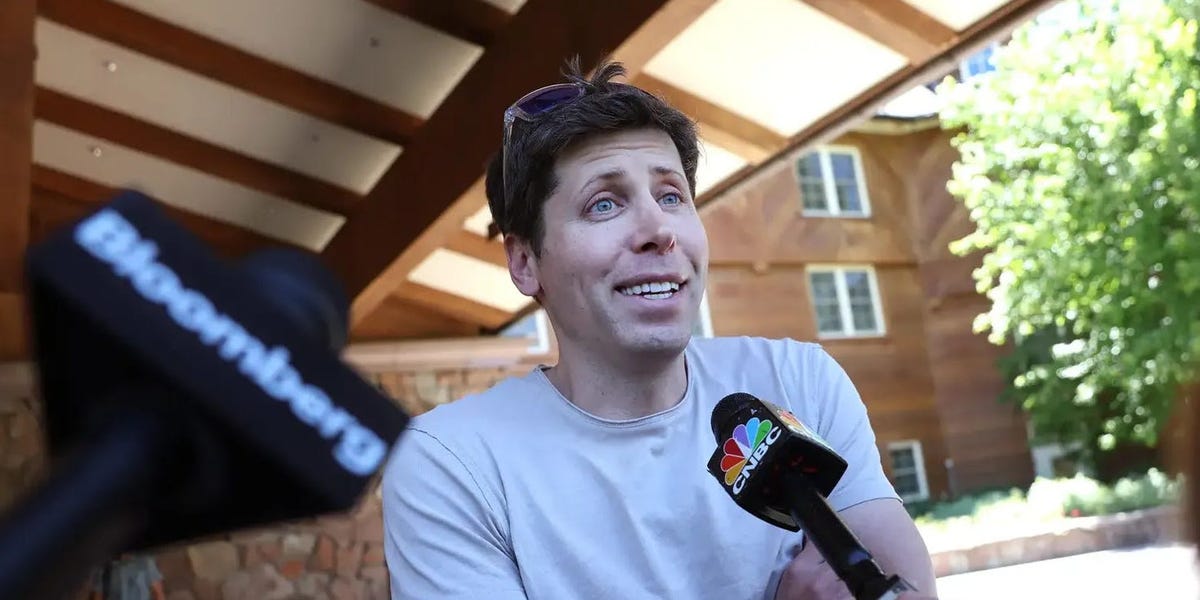OpenAI’s venture capital investors weren’t thinking about its mission to serve “humanity” by developing artificial intelligence. Nor were they thinking about returns. It all came down to their faith in one man: Sam Altman.
Altman had been instrumental in helping OpenAI and its employees solidify its position as the hottest startup in Silicon Valley, and any investor who had a foot in the door didn’t think twice about getting a piece of the pie, with “demand way outstripping supply,” an investor who focuses on AI startups and asked not to be named, told Business Insider.
Altman’s incredible reputation among VCs played a huge part, investors said, and no one ever expected that the board would make a move to oust him. “People just assumed Sam was in charge,” an investor said.
After Altman’s ouster, Vinod Khosla, an early investor in OpenAI, came to his defense despite the criticism.
“I’d trust @sama ethics and his integrity in balancing everyone’s interests, and presiding over a power tool like @OpenAI over ALL other prominent people in tech, business, Hollywood, politics, or the nonprofit sector on par with my trust in Prof Yunus,” Khosla wrote on X, formerly Twitter.
But before OpenAI became a household name, venture capitalists looking to make a profit stayed away from the company due to its nonprofit governance, one investor said, who asked not to be named.
OpenAl’s charter states clearly that the company’s “primary fiduciary duty is to humanity,” not profit-seeking investors.
Yet, the rapid development of technology, led under the former Y Combinator president Sam Altman, allowed many investors to look the other way when OpenAI’s “capped profit” arm came calling for capital in 2019. “Governance is very quickly put aside for hot startups,” the investor said.
That moment opened the floodgates for venture capital investment as firms like Thrive Capital, Tiger Global Management, Khosla Ventures, and Sequoia Capital came knocking at their doors with checks to invest. And since then Microsoft has offered up as much as $13 billion to take a 49% interest in the company, according to reports.
OpenAI’s complex and unique corporate governance structure meant that VCs could invest in the capped profit entity, but never earn any influence over the nonprofit board of directors, all of whom were either cofounders or appointed outside AI experts.
This was incredibly unique in the corporate world.
“Nearly all my boards have had fiduciary duties to the shareholders, not to the humanity thing,” said Wesley Chan, the cofounder and managing partner of FPV Ventures, a $450 million early stage fund.
According to OpenAI, it is first and foremost governed as a nonprofit, with that appointed board of directors, which before the chaos ensued, included Greg Brockman, OpenAI cofounder and president who also served as board chair; OpenAI cofounder and chief scientist Ilya Sutskever; Tasha McCauley, an adjunct senior management scientist at Rand Corporation, who’s also married to the actor Joseph Gordon-Levitt; Helen Toner, director of strategy for Georgetown’s Center for Security and Emerging Technology; Adam D’Angelo, the current CEO of Quora; and Altman.
But with Altman at the helm, and the technology itself and its promise was also a potential motivator for some investors.
“I think people clearly realized that this is going to be very, very transformative, so I think they were willing to accommodate a bunch of things,” said Karthee Madasamy, founder and managing partner of MFV Partners, a firm that focuses on deep tech like AI, robotics, and quantum computing.
Yet, it’s likely some investors were willing to be “founder-friendly” and in the case of OpenAI, one of the biggest names in Silicon Valley was hard to refuse. Madasamy, who was managing director at Qualcomm Ventures and on the board of Waze while there, says this founder-friendliness has been the case among startups for the past five or six years, where boards don’t want to be too restrictive of founders.
Khosla defended OpenAI’s board structure on X. “Many European companies, Ikea, Bosch, Novo Nordisk Foundation, Bertelsmann Foundation, Carlsberg Foundation etc have similar relationships between for profits and non-profits. Nothing wrong with the best of both worlds,” he wrote.
In response to that, David Sacks, a VC at Craft Ventures, wrote on X: “With respect, I think events of the last week have conclusively refuted this view, at least in the Silicon Valley context.”
The board structure and its governance are all likely to change as part of the deal to bring Sam Altman back as CEO of OpenAI. The purpose of the newly formed OpenAI board – consisting of current board member D’Angelo, former US Treasury Secretary Larry Summers, and former Salesforce co-CEO Bret Taylor – is to vet and potentially appoint an expanded board of up to nine people, and that Microsoft and Altman want board seats, The Verge reported.
What comes next is anyone’s guess.
Read the full article here





